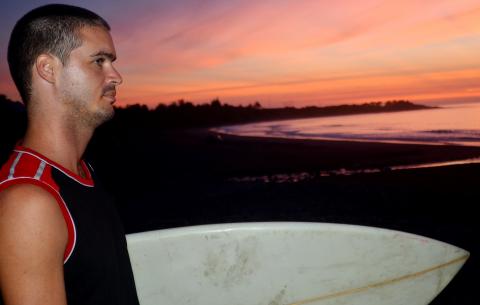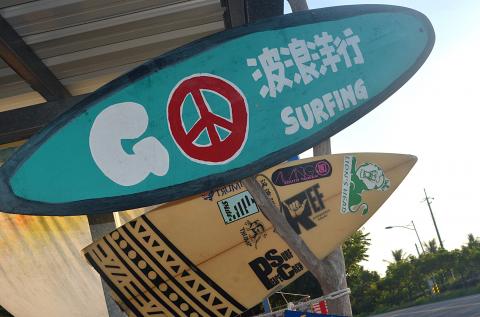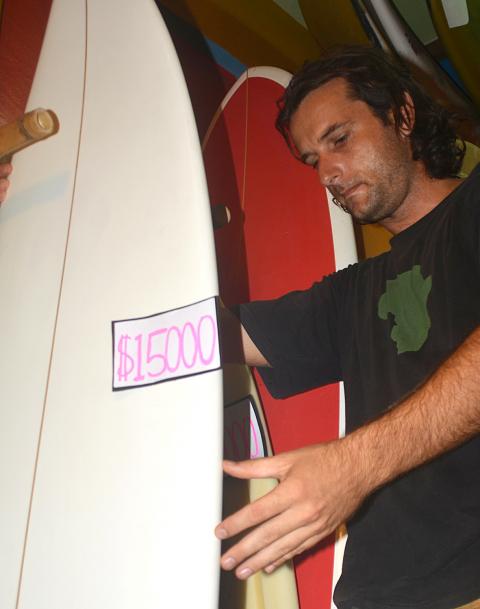It’s Sunday morning and Brazilian surfer Gabriel Gras is closely watching the waves breaking on Dulan (都蘭) beach of Taiwan’s southeastern coast. “I’m looking for something that is hollow and [tubular],” he says.
For the 28-year-old language teacher, sacrificing a Sunday lie-in for a chance to hit the sea is worth it. “When you catch a really good wave it feels like time slows down, you aren’t thinking about anything, you’re just reacting to the ocean moment by moment.”
Gras, resident of the nearby coastal town of Donghe (東河), is among a small but growing crowd of surfers who have come to Taitung County as rumors spread about the region’s waves.

Photo: Sam Sky Wild
On Saturday night, the Wa Ga Li Gong guesthouse is filled with travelers, and the slightly overworked-looking co-owner, Tienie Wessels from South Africa, is busy pouring pints and dispatching food. The bar area is bedecked with surf-inspired artwork and an area around the back is stuffed with boards.
“I’ve been surfing in Taiwan since I first arrived here 13 years ago,” Wessels says while mixing a cocktail. “Back then [in Yilan] there were ten people in the water and now there are hundreds … When we first came no one really knew about it but now people are coming specifically for the surf.”
Taitung is still off the beaten track, but it’s slowly gaining a reputation. “You can’t compare it to Indonesia for example — you don’t have the consistency of waves here — but you have got space in the water,” he says.

Photo: Sam Sky Wild
Slow start
Fellow South African expat and business partner, Mark Jackson, joins the discussion. “It’s weird, but the more affluent city people caught on to surfing before [Taitung] locals did, so Dulan has very few surfers,” he says.
Jackson’s bountiful energy — much of which he pours into his love of wind-surfing — masks the serious side of the guesthouse proprietor and aspiring film-maker. He has spent much time studying the history of Taiwan’s all-encompassing sea border.

Photo: Sam Sky Wild
“Martial Law made it impossible to surf,” he says. “And there was a huge stigma around the beach — the whole idolization of white skin where the sun is the enemy. But you also have to remember that the bunkers you can see on the beaches were in use until recently. There was also a mental frontier — years back going to the beach would have been like [an American] going to the frontier with Mexico during the Alamo!”
Academic research appears to support Jackson. In “Leisure Governance In Transition: The Case of Taiwan,” National Taiwan University of Arts professor Liu Chun-yu (劉俊裕) writes that “leisure activities and policy in Taiwan during the 1960s … were very much confined by Martial Law, which was enacted to secure the island … The government promulgated a set of regulations controlling … coastal districts and bathing beach areas.”
After the lifting of Martial Law, travel restrictions were dismantled and leisure activities became more multifaceted, according to Liu.
He and other academics also point to growing levels of disposable income and the introduction of regulations extending weekend holidays in 1998 as key to the growing interest among Taiwanese in coastal leisure pursuits.
Surf Economy
William Chen (陳仁傑), a 37-year-old Yilan native, says he took to the waves five years ago because a friend wanted to do “something cool on the beach.”
Chen was hooked instantly. “The first time I took off successfully it was so peaceful — I felt like I was standing on a cloud flying over the sea. I loved that feeling.”
The marketing executive has traded in his well-paid Taipei job to become an organic rice farmer. He now balances the needs of his Taitung-based firm “Surfer Rice” with regular trips to the nearby ocean.
As the wave of surfing enterprise continues to build strength, others have jumped on board. Amis Aboriginal Hana Lee runs brisk business at her Dulan-based surf shop, where she also offers surfing lessons.
“I’m a surfer and a housekeeper,” Lee says proudly. “I’m happy, it’s fantastic — I’m so excited when I can do a new trick or stunt, it’s even better than making money,” she says.
Three months pregnant with her second child, Lee continues to surf with her long-board and is resolved to carry on while she can. Her determination has cost her in the past, however, and a deep crimson scar — from encountering a bluebottle jellyfish — cuts across the top of her right arm. And even bigger foes may be lurking. Last November, a 4.5-meter-long Great White Shark was caught near Taitung’s increasingly popular Surf Comp.
However, most surfers remain indifferent to potential perils. “I haven’t given up,” says Lee, “I just chase smaller waves now.”
Baybay Niu (鈕臻琳), the only officially-sponsored Taiwanese female surfer who lives in Taitung’s unofficial surfing Mecca, Donghe, also has no plans to quit.
The 38-year-old, who has been surfing for 11 years, regularly competes against men at international events representing Taiwan. She says her goal now is to help grow local talent in Taitung.
“Kids here were brought up with the ocean and I’m teaching a lot of Aboriginal children to surf so that they will start earlier than me and become world class surfers,” she says.

In the March 9 edition of the Taipei Times a piece by Ninon Godefroy ran with the headine “The quiet, gentle rhythm of Taiwan.” It started with the line “Taiwan is a small, humble place. There is no Eiffel Tower, no pyramids — no singular attraction that draws the world’s attention.” I laughed out loud at that. This was out of no disrespect for the author or the piece, which made some interesting analogies and good points about how both Din Tai Fung’s and Taiwan Semiconductor Manufacturing Co’s (TSMC, 台積電) meticulous attention to detail and quality are not quite up to

April 21 to April 27 Hsieh Er’s (謝娥) political fortunes were rising fast after she got out of jail and joined the Chinese Nationalist Party (KMT) in December 1945. Not only did she hold key positions in various committees, she was elected the only woman on the Taipei City Council and headed to Nanjing in 1946 as the sole Taiwanese female representative to the National Constituent Assembly. With the support of first lady Soong May-ling (宋美齡), she started the Taipei Women’s Association and Taiwan Provincial Women’s Association, where she

It is one of the more remarkable facts of Taiwan history that it was never occupied or claimed by any of the numerous kingdoms of southern China — Han or otherwise — that lay just across the water from it. None of their brilliant ministers ever discovered that Taiwan was a “core interest” of the state whose annexation was “inevitable.” As Paul Kua notes in an excellent monograph laying out how the Portuguese gave Taiwan the name “Formosa,” the first Europeans to express an interest in occupying Taiwan were the Spanish. Tonio Andrade in his seminal work, How Taiwan Became Chinese,

Mongolian influencer Anudari Daarya looks effortlessly glamorous and carefree in her social media posts — but the classically trained pianist’s road to acceptance as a transgender artist has been anything but easy. She is one of a growing number of Mongolian LGBTQ youth challenging stereotypes and fighting for acceptance through media representation in the socially conservative country. LGBTQ Mongolians often hide their identities from their employers and colleagues for fear of discrimination, with a survey by the non-profit LGBT Centre Mongolia showing that only 20 percent of people felt comfortable coming out at work. Daarya, 25, said she has faced discrimination since she